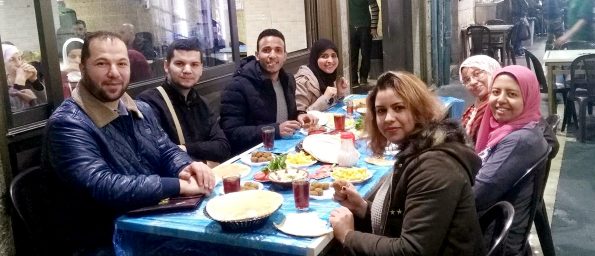By: Mokhtar El-Ibrahim
Amman — While touring downtown Amman with colleagues from around the Arab world looking for thyme, laurel soap, and raisins to bring home from the latest ARIJ workshop in Amman, I was impressed by something Ahmed said about Hossam. He was deeply surprised, he said, by the kindness and gentleness of Hossam.
You would think that journalistic colleagues, brother Arabs, would enjoy a natural bond. Souls are like conscripted soldiers; those whom they recognize, they get along with; and those they do not recognize, they quarrel with. So why the deep surprise? The question gets answered when you learn that Ahmed is Egyptian and Hossam Algerian.
Ahmed spontaneously says: “The truth is that, Hossam is a very handsome person and enters the heart, and I never had the opportunity to deal with any Algerian before. My memory about the Algerian people was formed when Egypt and Algeria met in a football match in Sudan. I’ve changed my mind about Algeria since meeting Hossam.” The ARIJ distribution of colleagues in hotel rooms forced the two to room together during the five-day workshop. That was long enough for friendship to take hold.
Strong friendship, Ahmed says: “We are now friends with all the values and meanings of the word.”
For those who do not remember as vivdly as Hossam, the controversy leading up to and during the 2010 World Cup qualifiers in South Africa set Egyptians against Algerians. Egyptians demonstrated by the hundreds in front of the Algerian embassy in Cairo demanding the ambassador be expelled and the embassy closed. It was another “Dahas and Alghbara” war in the making. Aside from football, politics were in play at this time of the Arab Spring and politicians eager to divert citizen attention away from internal corruption and unified calls for reform, did not mind fueling differences among people.
ARIJ workshops are always diverse, in contrast. They bring together people doing the same kind of work from many different counties. While skill-building is the major air of these meetings, there is another positive, hidden effect. Good relations grow among and between journalists. They see they are working on similar stories, confronting similar challenges, and facing the same kind of opposition and repression. They grow into a real brotherhood, working for countrymen and fellow Arabs rather than simply serving governments with their own agendas.
What made the scene in downtown Amman more meaningful was that it followed discussions about where all our countries stood on the ladder of transparency and corruption. None ranks high. Egypt and Algeria, though, were at the same low ranking, tied, according to the Transparency International survey. This is a competitive sport of another sort, only open to journalists, who are banned from broadcasting the dreary rankings.









Leave a Reply